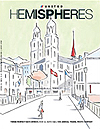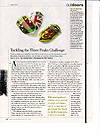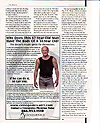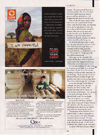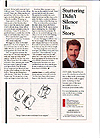» home » portfolio » adventure
The Three Peaks Challenge
Nick Stokes hops from foot to foot like an excitable kid wired on sugar at a children’s birthday party. At the bottom of Ben Nevis, the tallest mountain in the United Kingdom, the 51-year-old, who looks like a six-foot-two Dustin Hoffman with a riot of silver-spiked hair, chants: “Wicked! Let’s do it!”
The 51-year-old financial sales rep is also one of the most competitive men you are likely to meet. Cruising thousands of miles every year in a BMW while working 80-hour weeks has won him trips to Jamaica and Monaco. “People say I am like Jekyll and Hyde,” he says. “I’m a lovely bloke but I want to win everything at all costs.”
If anyone was going to triumph in the Three Peaks Challenge it was going to be him. The premise of the annual charity U.K. race sounds preposterous: hike up the three highest mountains in England, Scotland, and Wales, driving five to six hours between each, all within 24 hours. Ranging from 3205 to 4,408 feet, no single one would be considered a challenge by mountaineers. But add the climbs and descents and you have 22,346 feet of hiking.
The idea to do the Three Peaks Challenge is often hatched in a drunken fugue in the pub, among those with little outdoors experience. Wartime frugality has never really left us British and we make do with what we’ve got. We don’t have 35 000-foot peaks, but we can cram in several smaller ones to get the same effect, except we also add around 670 miles of driving Britain’s teeming roads.
Nick Stokes starts with me, my brother, his wife and his boss at 5.22am on a summer morning at the base of Ben Nevis in Scotland. We are one of 26 teams competing. Taking part was the idea of my brother’s boss – Stuart, another highly competitive man, one who was injured years ago while trying out for the Royal Marines, permanently sinking his lifelong dream of joining the military. Now that long-repressed militaristic spirit was reasserting itself. Team captain, he charges ahead of us up the mountain in voluminous navy shorts and antiquated hiking boots, clutching a map. He has the slightly eccentric look of a rampaging Victorian explorer. My brother Edward gave in to Stuart’s drive to find team mates from work and brought his wife Alison. Me? I thought it would be a good excuse for some fraternal bonding, a little fun and a chance to see Albion again from my home in New York.
Quickly, the fun stops. Nick had been training, going up and down a thousand foot hill behind his house four times after dark most nights. But this wasn’t walking; it was hand and foot climbing that makes the back ache. Cresting each ridge reveals not the summit, but just another spread of steel grey boulders. Neck bent and chin down, there’s no chanting now.
The team finally hits the peak – an apocalyptic-looking plateau – three hours after starting. At the top is the Texas Toms team, a bunch of fortyish- men with red, sweaty, beery faces. They belt out a tone-deaf rendition of Viva Las Vegas.
We check in with race officials before Stuart commands, “We haven’t got time to lie around.” He inhales heartily, and, sets off on his own down the mountain.” We follow on his heels, irritably. One crop-headed soldier from another team runs past “Me legs are like jelly,” he howls. Nick Stokes gamely plods on, his smile withering on his face.
Teams have backed up trying to get down the first – only the first – mountain of the day. The growing popularity of the event means it has become a victim of its own success – and many underestimate it. Some who volunteer to rescue people from British peaks say the contestants are generally ill-equipped and lack the physical fitness and mountain expertise the mountains require.
The race was originally the idea of Major HW Tilman, a very British adventurer and war hero with a waxed moustache above a very British stiff upper lip. His original idea was that teams would sail between the peaks down the western coast of the country. The first race took place in 1977 and quickly became a fixture with the British army and RAF. The redoubtable Major Tillman never got to see its massive popularity. He is thought to have perished while sailing to Antarctica for his 80th birthday.
Would that it happened before his twisted, sick mind could devise this outing. After ten miles and 5 hours and seven minutes of knee-jarring hell on Nevis, we reach the parking lot. With mud spattered aching calves, soaked in sweat and fatigued, one of us now has to get behind the wheel for five hours.
Super salesman Nick Stokes jumps behind the wheel and whisks us away. The race calls for at least a minimum travel time between peaks to discourage dangerous driving. “I’ll make time,” says Nick, as he grits his teeth and drops the van into a howling third gear before swinging out around a blind bend and overtaking a retired couple in a red hatchback. I tense up in terror in the front seat as he redlines the protesting van, flinging it down the winding roads around Scottish Lochs like an ambulance containing a heart attack victim. Stories abound of cars crashing and rolling cars in the challenge as most entrants speed – and some fall asleep at the wheel – to finish the race within the alloted 24 hours. In a stench of rubber smoke, we roar down the M74. His mood becomes a babble of good cheer as we hit an even 90mph: “I’m mad me!”
We reach Scafell Pike in England’s Lake District at 4.45pm, slightly later than our 3.59pm start time. Nick’s driving has jumped us from 15th place to 8th. Around us are prehistoric stretches of mauve water surrounded by purplish peaks, scarred with spurs and crevices. The mountain drops sharply at a 90 degree angle into the inky black 260 ft depths of Wastwater Lake. Above, the fish belly sky begins to turn black as we stagger out of the vehicle, grimacing, trying to warm up deadened muscles.
“This is the shortest one of the lot,” offers Stuart. True. But it was also the steepest. The scree-covered slope had a merciless gradient. For every two steps forward we slid back one. Previous groups, stuffing carbohydrates, had dropped banana skins all over the trail.
Nick, for the first time, starts to drop back. We start to pull ahead of other teams – past the Texas Toms, now bent double and heaving for air. As the light begins to fade, the race to the summit becomes a battle of attrition. The view at the top is spectacular, but who cares? Breathless and blistered, we give our names to the marshal, and abruptly descend. Or, rather, tumble downhill, pulled by gravity.
My brother’s left knee begins to give out. He only stops at the insistence of his wife. Nick, desperate to get down the mountain without delay, grabs his rucksack. Edward’s pride has been damaged and he retreats into himself. We pass a 21-year-old dizzy in pain from a twisted knee, his left leg strapped up with a bandage, hobbling down with his arm around one of his team mates. Painfully, we shuffle back to the car. “I’m knackered,” Stuart says, as he tears off his hiking boots at the car.
Nick insists on driving again. He charges off, the floor of the car an inch high in power bar wrappers and energy drink packs, as our heads snap with whiplash.
No one says anything for a few miles as we speed towards Wales. I try to break the tension. “Look,” I say. “It’s not the finishing in 24 hours that’s important. It’s just finishing,” I may as well have blurted out that I have a sexual predilection for young boys judging by Nick’s face, illuminated by the dashboard light, his knuckles turning white on the steering wheel. “Nice if we could though, eh?”
Dusk turns to darkness, the rhythmic hum of the tires on the motorways lulls everyone, bar Nick to sleep. As we race through North Wales at midnight, drunks stagger out of pubs under hazy street lamps. After a further 200 miles and four and a half hours, we reach the foot of Snowden. “Let’s just go to the hotel and forget the last one,” feebly jokes Edward. No one laughs. Tired and desperate, we continue.
Our headlamps throw out pencils of light, shining off coal-black rock veined with pink quartz. The mountains are forbidding inky black towers over us, the night is eerily still, mist now and again obscuring the moon.
Despite glow sticks being left to mark the trail, it’s almost impossible to see where it leads in the dark. Obstacles constantly clutter the path. Knots of granite upwards of 12 feet high have us back on hands and feet. The only sounds are the scrunch of hiking boots on shale and grunts of pain. A mile ahead, other headlamps are a faint glow up a steep path, a sad death march.
At around 3 000 ft Edward collapses on a rock. He has hardly eaten and hasn’t drunk any water. “There’s no point killing yourself.” Stuart says. Alison puts a consoling arm around him. I offer him a Mars bar. He tugs on it, slowly chewing. After a minute or two, he mumbles, “I’m going on.”
Forget speed – it’s around 1.30 in the morning and we have under three hours to reach the summit. Each lungful of air is cold and damp. About halfway up a tent sits near a precipitous drop in the darkness. “Team 15!” we shout. A grey haired man in a woolen hat sticks his head out and blearily does a head count.
“How much further?” gasps Nick.
“A good hour I would say,” he answers.
Nick exhales and then grunts.
We stagger on. Team 14, two exhausted guys in their twenties, draw alongside. It’s 2am - 15 hours since we started the race. We’ve walked 20 miles up and down sharp, boulder strewn gradients while also driving over 400 miles at high speed.
Nick, the aggressive salesman who wins at any cost – his body cramping with lactic acid - stops and thinks about quitting, maybe for the first time in his life. This is beyond bad – it’s dangerous. The weather has suddenly turned and visibility has withered to five feet, making it impossible to see the treacherous path ahead. Nick begins to slip into delirium. A gusting 30mph wind rips at his Gore-Tex jacket and brings a wind-chill of zero. Misted breath, briefly illuminated by his headlamp, jets from his nostrils in a fast, halting rhythm. His skin is grey and waxy. There are dark hemispheres under his eyes. “I feel dizzy,” he wheezes. “I gotta stop.” He slumps in a slimy rivulet that seeps into his pants and drops his head in his hands.
Somehow Alison manages to coax him, and he stumbles forward. Twenty minutes later we reach the summit. We can’t see the marshal a few yards ahead but we can hear him shout on his radio. He’s had to weight his tent down with rocks to keep it from blowing away.
There is no elation because we dread the climb down. Alison tells Nick to follow her down, head down, panting. We all want to stop but time is draining away fast. For two hours, horror melts together into a haze. A steeling, dawn light begins to fall over the mountain. We make out the scattered buildings in the valley at the start of the trail. Hobbling, we give our names to the marshal.
It’s over. A glass of champagne is offered to us, but none has the energy to accept. We just collapse into heaps on the concrete outside. Eventually we pick ourselves up and found a local hotel where we slept for 24 hours straight.
For Nick things were never the same again. His 80 hour work weeks have evaporated. “I have mellowed,” he says. “Not completely, I mean I still want to win but I now enjoy my life more.” Every opportunity he has to leave the seat of his BMW he heads for the hills. He has tackled Snowdon twice more and Ben Nevis too. Every time he goes, he tries to make it up and down a little faster than he did before.
